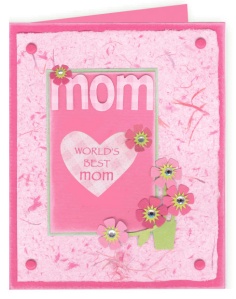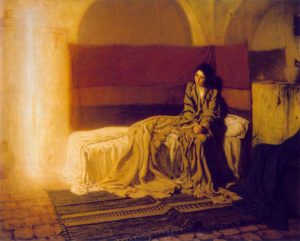As he said these things, a woman in the crowd raised her voice and said to him, “Blessed is the womb that bore you, and the breasts at which you nursed!” Luke 11:27
A random voice calls out a blessing on his mother. What was behind it? Perhaps it was totally heartfelt and spontaneous: a woman lays hold on womanhood, goes back to Eve the mother of all living and drags her forward as some sort of honored consort or partner to Messiah. Or this might be a customary blessing among women for a favored son. Or maybe she’s looking for a way to distinguish herself and attract his attention (full disclosure: that would be my motivation). There’s nothing wrong with her—no malady or affliction to catch his eye or attract his touch, but there’s something about him that opens people up, especially—perhaps—women. None of that fierce, forbidding air that keeps them at arm’s length from the prophets or rabbis. For whatever reason—probably a mix of them—she cries out.
Whatever she expected, his response is not it. “Blessed rather are those who hear the word of God and keep it!” This is not a put-down; it’s a correction. He does not deny his mother’s blessedness, spoken by her cousin Elizabeth (1:42), but he shows it’s beside the point. Motherhood, fatherhood, family tranquility, child training and childlike love, all are beautiful things. But they are not primary things, or stand-alone things. Mother’s day is subordinate to Pentecost, and enjoying God’s order is secondary to hearing and doing his word.
It’s not a pink carnation. But carnations don’t last long anyway.
Along about now, a subtle shift occurs. His teaching, always a challenge to the listeners, is taking on an edge: “This is an evil generation. It demands a sign”—harking back to 11:16, where some stubborn individuals were demanding a confirmation from heaven even as Jesus was driving out a demon on earth. His word should be enough—pagans in Nineveh, the world’s most wicked city at the time, recognized the word when it came to them. The Queen of Sheba understood where Solomon’s wisdom came from. But this generation is privileged to have One greater than Jonah, Solomon, Elijah, even Moses standing before them, and they don’t recognize him. (He came to his own, and his own people did not receive him, John 1:11.)
But do we? He says “something greater,” not “someone greater.” The “thing” must be the kingdom, heralded by signs and manifested in words. We recognize the One but not always the Thing—that is the lordship, the authority, the demands, the rewards, the response, the life that man and his kingdom demand of us. It’s all wrapped up in him, but it requires everything from us.
For the original post in this series, go here.
Next>


